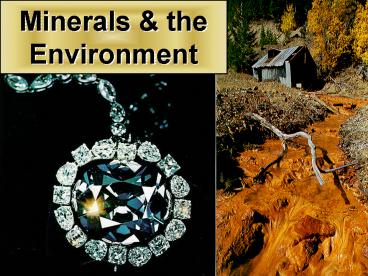Minerals PowerPoint PPT Presentation
1 / 50
Title: Minerals
1
Minerals the Environment
2
Uses Of Minerals
3
Minerals
- A solid homogenous (crystalline) element or
compound naturally occurring
4
Types of Minerals
- Metallic
- IRON, main component of steel
- COPPER, used in electrical wiring
5
Types of Minerals
- Non-metallic
- PHOSPHOROUS, medicines
and detergents - SULFUR,
used to make
tires, paints,
paper, etc.
6
High-Grade Ores
- Rocks that contain large enough quantities of
minerals to be profitably mined
7
Mineral Distribution Abundance
8
Forming Mineral Deposits
- Magma Chambers
- Hydrothermal Processes
- Sedimentary Weathering Processes
- Evaporative Processes
- Biological processes
9
- Ores are deposited at convergent and divergent
plate boundaries
10
Divergent Boundaries
- Water is heated by molten rock in MAGMA CHAMBERS
- Heated water
rises through
rocks, leaches
minerals
deposited
when water
cools
11
Convergent Boundaries
- Heat causes rocks to melt, minerals are separated
by density.
- Different
minerals
form at diff.
temp - Ex.
Mercury
12
Igneous Processes
- As magma cools, the heavier minerals crystallize
first, causing them to fall, and the lighter
minerals rise above them.
Sills form when magma intrudes between the rock
layers, forming a horizontal or gently-dipping
sheet of igneous rock. Dykes form as magma
pushes up towards the surface through cracks in
the rock. Batholiths are large, deep-seated
intrusions (sometimes called Plutons) that form
as thick, viscous magma slowly makes its way
toward the surface, but seldom gets there!
13
Igneous Processes
- When deposits of carbon are buried and
subjected to pressure
DIAMONDS
14
Kimberly Diamond Mine
Anyone know where this is?
15
Hydrothermal Processes
- Chemical reaction occurs between metal salts
carried in super-heated ground water and sulfur
in earths crust forming metal sulfides
16
Hydrothermal Processes
- Metal sulfides are not soluble in water and are
deposited (Gold
Silver
deposits)
17
Sedimentary Processes
- Water and wind can separate materials by their
size, shape and density - Phosphorus Sulfur
deposits
Toroweap Formation in the Grand Canyon, Arizona
18
Palos Verdes Cliffs
19
Sedimentary Processes
- Water can also concentrate minerals found in
stream bedrock - Minerals collect in fissures and pits in slow
parts of the river--Placer Deposits
20
Weathering Processes
- Weathering of soils can cause deposits to form.
Erosion in the Himalayas. Where are the
Himalayas?
21
Weathering Processes
- Aluminum deposits are formed by the weathering of
aluminum rich bedrock
22
Weathering Processes
- Metal sulfides in the soil react with oxygen and
water. The fluid carries the minerals down
toward the water table where they are
concentrated - ex. copper deposits
23
Evaporation
- Water can also concentrate minerals when it
dries/ evaporates - ex. salt,
K salts
CaCO3
Calcium carbonate deposits in Mono Lake, Ca
24
Biological Processes
- Ore deposits can be affected by biological
processes. There are 31 biologically produced
minerals - Iron deposits come in two forms
- gray - red
25
- The red form (oxidized) was deposited after
plants had produced O2 - Iron deposits stopped
forming when
O2 reached
current levels
26
Biological Processes
- Organisms create calcium (shells)
27
How Large Is Our Mineral Supply?
- Mineral deposits that have been identified and
are currently profitable to extract - Current copper reserves are estimated to last
until 2029
28
Mineral Reserves
- Deposits of low grade ores that are
currently
not
profitable
to mine
29
World Reserves
- Combination of global mineral reserves and
resources
30
How Minerals Are Found, Extracted Processed
- Vibrator truck
31
Discovering Mineral Deposits
- Survey of Earths Crust
- Satellite or Aerial photographs of geological
features to give general idea
where mineral
deposits are located
32
Discovering Mineral Deposits
- Drilling For Mineral Samples
- Analyze chemical composition of
samples to
identify
presence of minerals
33
Extracting Minerals
34
Surface Mining
- Open-pit extraction quarry is dug and mineral is
extracted - Copper,
Iron,
Sand,
Gravel,
Limestone
35
Surface Mining
- Bucketsscrape surface ore
36
Strip Mining
- Trench is dug and minerals are extracted
- New trench is dug parallel to old trench
37
Strip Mining
- Overburden from new trench is deposited in old
producing a spoil bank
38
(No Transcript)
39
Strip Mining
- Spoil is replaced in rows
- Spoil is susceptible to erosion (sediment
pollution)
40
Strip Mining
- Rainwater leaches chemicals into ground water
(acid drainage)
41
Placer Mining
- Huge amounts of water are used to separate gold
ore (by density) that has been weathered and
deposited in streams - Mercury often used to
bind gold
42
Placer Mining
43
Placer Mining
- Amazon gold miners are using mercury and have
dumped 100 tons of mercury into the Amazon river
44
Subsurface Mining
45
Subsurface Mining
- Shaft mine dug vertically to mineral deposit
- Less environmental impact, but more
dangerous
to workers
46
(No Transcript)
47
Gold Mining
48
Heap-leach Extraction
- Separates gold from low grade ores
- Sprays rock with CYANIDE to dissolve gold
- Mining sites
are often left
unaltered
high toxin
levels
49
Dredging
- Buckets and draglines scrape underwater deposits
50
Dredging
- Mineral-containing ocean ooze is deposited in
settling
container for
later
extraction

